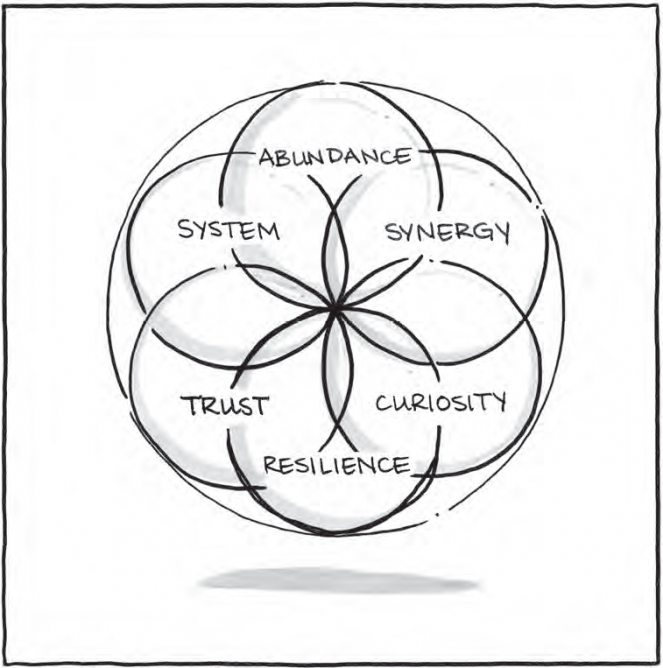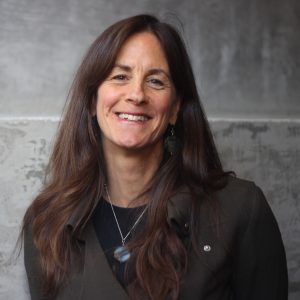[This post is based on excerpts from Re-Aligning with Nature: Ecological Thinking for Radical Transformation]
The 12June2019 post of this blog proclaimed Sustainability is Impossible in the “Real World”, with the “real world” being based on the assumptions of the Conventional Paradigm: Scarcity, Individualism, Competition, Greed, Resistance, and Fear. Sustainability, viewed through this conventional lens, pits profit against people and the planet, pits work against life. It focuses on individual metrics, binary choices, and oversimplified relationships that tend — or intend — to ignore the system, ignore what we don’t know, or would rather not know.
So how can we possibly achieve sustainability?
First, we have to recognize that Nature is the REAL “real world”. Nature came long before humans created unsustainable profit-driven constructs, and it will certainly outlast us.
Then we have to (re)learn from Nature how to create renewable, recyclable, regenerative, and profitable products and processes. We have to re-align everything we make and do with Nature, because Nature determines what is sustainable. That is sustainable design.
Re-aligning with Nature requires understanding — or perhaps simply revealing and remembering — our Natural Paradigm and then reinterpreting it into language and forms and tools that are practical for businesses, organizations, and our modern selves.
What is our Natural Paradigm?
Nature’s framework of fundamental assumptions is embedded in the DNA of all living things, including humans. It is what drives our thinking, our behavior, and how we interact with the world — when we aren’t wrangling with conventional constructs. The Natural Paradigm — expressed in human terms — can be characterized by six interconnected, mutually-reinforcing elements: Abundance, Synergy, Systems, Trust, Resilience, and Curiosity.
Abundance: For most of us, the most important things in life are not only free, they are abundant. The more we share, the more we have, the more there is, the more there will be. The more we leverage things that are abundant and the less we rely on things that are scarce, the less we will be limited by perceived scarcity in our thinking, in our creativity, and in our potential.
Synergy: If competition were the predominant law of Nature, why are there forests and prairies, flocks and swarms, communities and neighborhoods? How could you have a lawn? Synergy can take us beyond competition, beyond cooperation, and even beyond collaboration. It is the basis for co-creativity, emergent thinking, collective wisdom. It is what can make the impossible, possible.
Systems: Your body outsources many of your life-support functions to Nature’s systems. You can’t survive without the ecosystems inside and outside of your body. Knowing we are part of innumerable dynamic, interconnected, interdependent systems gives you endless access and opportunity, builds adaptability and resilience.
Trust: Trust is taking what you need, sharing what you don’t, and knowing everyone else will do the same. It requires knowing what’s important, knowing what you value, and acting accordingly. Always. Sometimes trust is simply the lack of distrust.
Resilience: Resilience is the ability to recover from disturbance, to bounce back. It’s about always driving towards positive outcomes, regardless of where you are. It’s about creating solutions rather than solving problems.
Curiosity: “I wonder . . .” are powerful words. They can turn fear into knowledge, understanding, imagination, creativity. They can shatter ignorance. Curiosity catalyzes engaged respectful conversations. It is the core and the door to co-creativity, to emergent collective thinking.
So how can we achieve sustainability?
We need to reclaim our Natural Paradigm. Those of you in the sustainability world are already seeing it work, sensing its power. It’s emerging under other names: happiness quotient, employee engagement, positive company culture, transparency, work-life balance, passion and purpose, authentic leadership, enlightened self-interest. It is also emerging in the parlance of the most innovative companies: fail fast —fail forward, always learning, design-thinking, systems thinking, human-centered, applied improv, entrepreneurial, agile, rapid prototyping, blue ocean.
We can resist. We can choose to stay the course, look out for number one, get a lot while we can, climb the ladder, win the battle. Or we can answer the call of Nature. Natural selection, being what it is, will eventually choose for you, for us. So why not let Nature take its course?
Are you interested in re-aligning with Nature? We welcome you to explore our MA in Sustainable Design program!
[Image courtesy of Stefanie Koehler MASD 2013, from the book she illustrated, Re-Aligning with Nature: Ecological Thinking for Radical Transformation]

